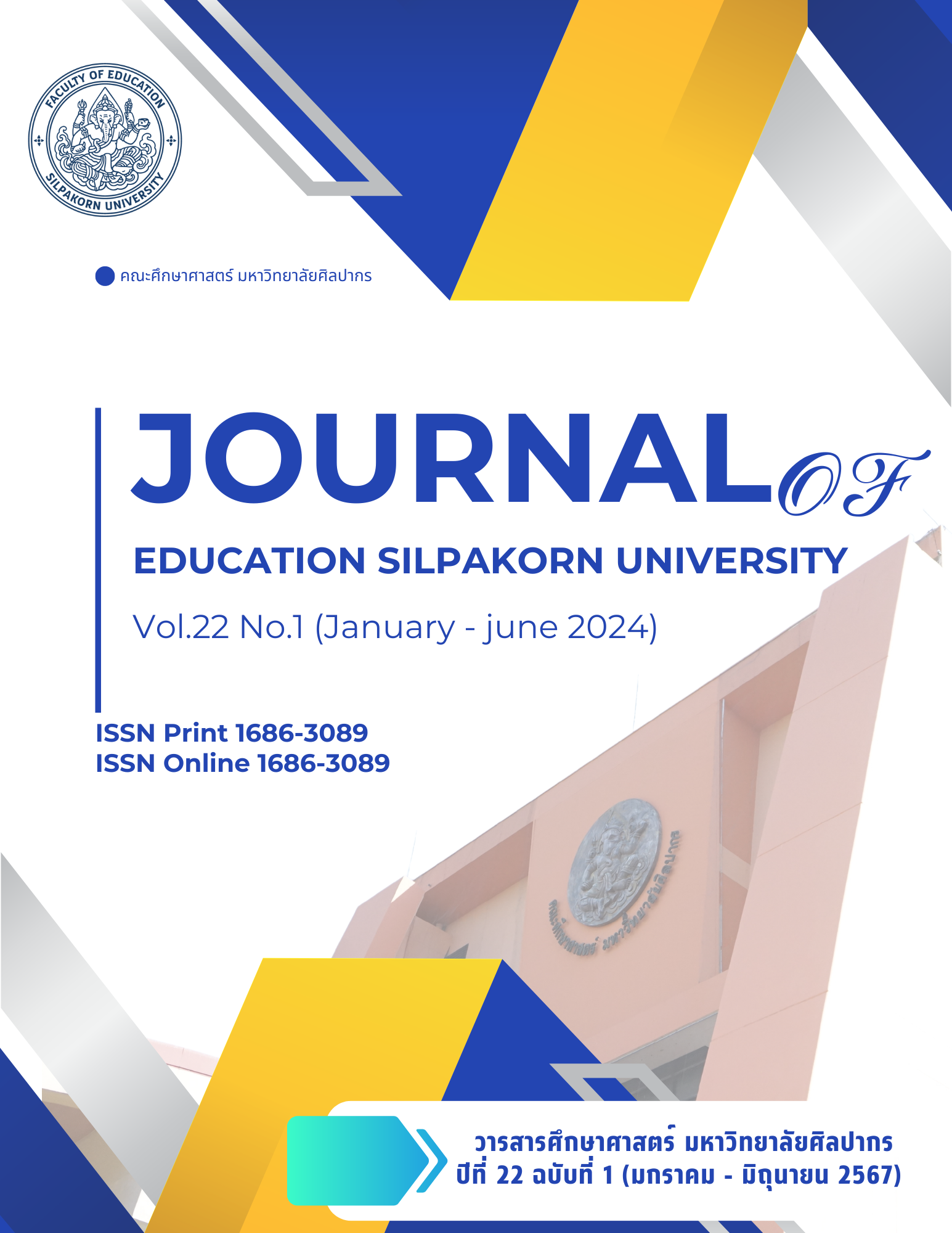เทคนิคการตั้งคำถามแบบโสเครติสเพื่อการคิดอย่างมีวิจารณญาณ
Main Article Content
บทคัดย่อ
การคิดอย่างมีวิจารณญาณมีความสำคัญสำหรับการเรียนรู้และการดำเนินชีวิตในโลกปัจจุบันเนื่องด้วยปัญหาการหลงเชื่อโฆษณาสินค้าและบริการที่เป็นเท็จ การตกเป็นเหยื่ออาชญากรรมทางเพศผ่านการพูดคุยกันทางโลกออนไลน์ การศึกษาพบว่า กระบวนในการคิดอย่างมีวิจารณญาณมีขั้นตอนดังนี้ 1) กำหนดเป้าหมาย 2) ระบุคำถาม 3) ประมวลข้อมูล 4) ตั้งสมมุติฐาน 5) ลงข้อสรุป และเทคนิคที่สามารถนำมาใช้เพื่อการเสริมการคิดอย่างมีวิจารณญาณได้ คือ เทคนิคการตั้งคำถามแบบโสเครติส โดยมีรูปแบบการถามดังนี้ 1) คำถามเพื่อเปิดความคิด 2) คำถามเพื่อให้สร้างความเข้าใจแจ่มชัด 3) คำถามเพื่อขบคิดความแจ่มชัดนั้นให้เกิดเป็นมโนทัศน์ 4) คำถามเพื่อแสวงหาสมมุติฐานอื่นหรือก่อให้เกิดสมมุติฐาน 5) คำถามเพื่อทบทวนวรรณกรรมที่เกี่ยวข้องเพื่อสนับสนุนสมมุติฐานนั้น 6) คำถามเพื่อขยายมุมมองจากสิ่งที่ได้ 7) คำถามเพื่อให้อนุมานพยากรณ์ผลลัพธ์ที่จะเกิดขึ้น 8) คำถามเพื่อพิสูจน์คำจำกัดความ ในการจัดการเรียนรู้มีรูปแบบวิธีการมากมายในการจัดการเรียนรู้ที่สร้างการคิดอย่างมีวิจารณญาณ เทคนิคการตั้งคำถามแบบโสเครติสก็เป็นอีกวิธีการหนึ่งที่จะเสริมสร้างเกาะป้องกันทางปัญญาให้สามารถดำรงชีวิตในสังคมได้ในทุกยุคสมัย รู้เท่าทัน ไม่ตกเป็นเหยื่ออาชญากรรมใด ๆ
Article Details

อนุญาตภายใต้เงื่อนไข Creative Commons Attribution-NonCommercial-NoDerivatives 4.0 International License.
เอกสารอ้างอิง
Amornchewin, A. (2013a). Critical Thinking. Bangkok: Parbpin company Limited.
______________. (2013b). Thinking Classroom, Transform the classroom into a thinking room through philosophical inquiry. Bangkok: Critical Thinking Institute.
Binreem, S. (2021). Development of Measurement Scale on Critical Thinking Skills in the 21st Century for Lower Secondary School Students by Applying Polytomous Item Response Theory (in Thai). [Master’s thesis]. PSU Knowledge Bank. http://kb.psu.ac.th:8080/psukb/handle/2016/17834
Decaroli, J. (1973) “What Reason Say to The Classroom Teacher: Critical Thinking”. Social Education, 37(1), 67 – 68.
Deway, J. (1933). How We Think. New York: D.C. Healt and Company.
Fisher, R. (1998). Teaching Thinking: Philosophical Enquiry in the Classroom. London: Cassell.
Kaenin, T. (2011). Socratic teaching method (in Thai). Journal of Education Prince of Songkla University, Pattani Campus. 22(2), 156 – 166.
Khammanee, T. (2005). Pedagogical science: knowledge for organizing learning processes that promote problem solving abilities for students in higher education (in Thai). Journal of Education. Mahasarakham University. 12(12). 83–96.
_____________. (2017). Teaching science (21 ed). Bangkok: Chulalongkorn University publishing house.
Ministry of Education. (2010). National Education Act B.E. 2542 and edited additional (No. 2) B.E. 2545 and (No. 3) B.E. 2010. Bangkok: Printing House, Shipping and Parcel Organization.
Munkham, S. (2002). Critical Thinking Teaching Strategies (in Thai). (3rd printing). Bangkok: Pubpim.
Nekmanurak, P. (1994). Development of a model of developing critical thinking for teacher students (in Thai). Doctorate of Education Thesis graduate school. Chulalongkorn University.
Paul, R.W. (1990). Critical Thinking: What Every Person Needs to Survive in a Rapidly Changing World. Rohnert Park, CA: Center for Critical Thinking and Moral Critique.
Phakhaphamongkholchai, W. (2016). The Development of Critical Thinking Skills on Microeconomics Using Research-Based Learning of Matthayomsuksa 5 Students. (in Thai). [Master’s thesis]. http://ithesis-ir.su.ac.th/dspace/handle/123456789/1060
Phoyen, K. (2022). How to teach students to think critically (in Thai). Journal of education Silpakorn University, 20(4), 11-25.
Phra Brahmapundit (Dhammacitto, P.). (2016). Greek philosophy: the source of Western wisdom (8th ed). Bangkok: Siam Paritut Publishing.
Pornkul, C. (2011). Teaching Thinking Process, Theory and Practice. (2th ed). Bangkok: Chulalongkorn University publishing house.
Scriven, M. and R. Paul. (1999). National Council for Critical Thinking. https://www.criticalthinking.org/pages/the-national-council-for-excellence-in-critical-thinking/406
Siripongnapat, V. (2023). The Enhancement of Active Citizenship for Learners through Socratic Questioning. Journal of Education Studies, 51(1), EDUCU5101008 (13 pages) doi: 10.14456/educu.2023.8. Retrieved from https://so02.tci-thaijo.org/index.php/EDUCU/article/view/258400
Songkroh, S. (2019). The Development of Critical Thinking Ability on good Democratic Citizenship of Mattayom five Student Using Problem-Based Learning Management (in Thai). [Master’s thesis]. Ithesis. http://ithesis-ir.su.ac.th/dspace/handle/123456789/2703
Sriwat, L. (2006). Thinking. Bangkok: Odeon Store.
Suarez-Alvarez, J. (2021), “Are 15-year-olds prepared to deal with fake news and misinformation?”, PISA in Focus, No. 113, OECD Publishing, Paris, https://doi.org/10.1787/6ad5395e-en.
Tosuksri,W. (n.d.). Clinical Teaching: Questioning (in Thai). Feculty of Nursing. https://ns.mahidol.ac.th/english/th/departments/MN/th/med-index.html
University of Kent. (2022). Independent learning & critical thinking. https://www.kent.ac.uk/guides/independent-learning-and-critical-thinking/critical-thinking


